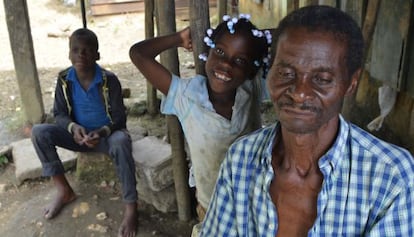“The sugar cane has dried up. Do they want to finish us off, too?”
Thousands of Dominicans, living under harsh conditions in decrepit sugar cane mills where their Haitian ancestors worked, may be stripped of citizenship rights


In the wood and zinc hut where Elena Lorac Pies grew up hangs the picture that captures the moment when she began to suspect that her life was on hold. It's a medium shot of Elena, dressed in a green robe and black graduation cap, holding up her primary school diploma. Elena was born in the Dominican Republic on October 18 1988 to a couple of Haitian farmhands who had migrated in the 1970s with a permit to work in the Dominican sugarcane industry. Since leaving school, Elena and her parents have tried and failed to get the Junta Central Electoral that houses the civil registry office to give her a copy of her birth certificate. On September 23, Elena knew that she would never receive that document. That day the Constitutional Tribunal ruled that children of non-resident foreigners born in the Dominican Republic since 1929 will no longer be considered citizens.
"How can they say we have no identity if our parents listed us in the official birth registry as the law required?," Elena asks while she shows the documents that officials gave to her parents. She unfolds an old document issued in 1993 by the Junta Central Electoral certifying that her birth was entered in the registry of Sabana Grande de Boyá, a municipality 90 kilometers outside of Santo Domingo. Sabana Grande de Boyá is surrounded by old bateys or sugar cane communities that once served the plant in Río Haina. Since the mill was privatized the bateys have become ghost towns.
Elena's parents had used their fichas or work permits from the Consejo Estatal del Azúcar, or State Sugar Council that sanctioned the Haitian worker's legal right to work in the country during the harvest. The permit had the name of the laborer, the year for which the contract was signed, the name of the employer and the community to which the laborer belonged, and the wet stamp of the mill for which he worked. During the US occupation of both countries in 1915 and 1916, Haitian labor was the motor that kept the industry running. From 1952 to 1966 work contracts were subject to negotiations between the two governments of the island.
Although they were not slaves, the farmhands lived in captivity They could only frequent the batey and the surrounding workers' colonies. There they just had access to the basics - a grocery store to buy food and a small medical center. In the batey Verde de Enriquillo, where Elena's mother still lives, the former home of the foreman, the warehouse for tools and the huts where the workers lived - long lines of wood and zinc sheds with dozens of doors on both sides - are still standing. Behind each door, in a space of about 5 cubic meters, Haitian and Dominican workers lived in groups of five or six. Now whole families squeeze in including the third and fourth generations of Dominicans born of Haitian parents.
The descendants of these families, considered Dominicans per jus solis ( right of the soil) principle that determines nationality on place of birth and was enshrined in the Dominican constitution until the reforms of January 26, 2010, received Dominican birth certificates and ID cards. They could vote and run for public office.
Since 2007 some have had difficulty getting their papers when the Junta Central Electoral approved Resolution 12-07 denying their right to such documents amidst a civil registry purge based on the argument that it was overrun with fraudulent certificates obtained through bribes. The purge began with the Haitian names, written in phonetic Spanish - Antuan, Lorac, Pol, Sebil, Sentilis.
But the selective review had been happening for a long time. In 2005 the Inter-American Court of Human Rights condemned the Dominican Republic for violating the right to name, citizenship, and equality before the law to two girls of Haitian descent born on Dominican soil, Dilcia Yean y Violeta Bosico. The registry had refused to issue birth certificates for the girls.
There are no reports of children of other foreigners other than Haitians facing this process in the country.
The 2010 constitution exempted children of foreign-born persons saying that their status was "transitory" or that they "lived on Dominican soil illegally." But it also recognized citizenship rights to those who had been born before the reform was approved. Juliana Deguis, 29 years old, appealed to the high court when the Junta Central Electoral refused to issue her documents. In its ruling in September, the Tribunal determined that no child born after 1929 of a illegal alien would have the right to citizenship. According to the calculations in the ruling about 665,148 immigrants or 6.87 percent of the country's population will be affected.
Dilia Sentilis and her husband, Euris Sebil, are pastors at the Pentecostal church, Assembly of God. They have the eight children that God sent them. With their federal IDs they registered the children except the little one who is six months old.
Since 2007 Dilia and Euris have been holding prayer meetings with their family members from batey Sabana Larga to ask for the repeal of Resolution 12-07 and a reversal of the Tribunal's latest decision. "It's not that God is not seeing what's happening but he allows these things because...I don't know why he allows them but maybe with his help it will be resolved," she prays. "When there was sugarcane they didn't do anything of this. Now that the sugarcane has dried up, do they want to finish us off, too?"
It's been almost a decade since cane workers stopped roaming the batey of Sabana Grande de Boyá. The mill, Río Haina, that fed off those plantations had been the largest sugar plant in the world since it opened in 1950. It was closed to a private company and then it was shut down. Where there was sugarcane now there are trees for wood production. More than half of the 12 sugar plants in the country working under the State Sugar Council since the death of dictator Rafael Leonidas Trujillo in 1961 met with the same fate: they were sold between 1966 and 1998 and then closed years later.
Only five of those mills are still in business. Barahona is in the hands of Consorcio Azucarero Central in which the major shareholders are American and French. The mills Cristóbal Colón y CAEI (formerly known as Ingenio Italia) is the property of the Vicini family. Romana operates with a mix of foreign and national investment and Porvenir was renovated by a Spanish firm.
Haitian hands continue to supply labor for these plants. Laborers earn 200 pesos (less than 4,50 dollars) per ton of sugarcane cut down.
The Dominican sugar industry is no longer thriving. The Brazilian producers have taken over 65 percent of the market. Still, the Haitian laborers keep coming to look for work on rice, banana and coffee plantations. The local producers that export some of these crops to Europe under the Economic Partnership Agreements have to respect labor laws and basic rights of migrant workers. But a large sector of the Dominican industry resorts to illegal trafficking of persons to use as muscle in factories, construction and retail.
Haitian migrants are not only found in the old mills. Many live in the poor urban neighborhoods throughout the country. Some bateys, like Verde, have deteriorated into shantytowns where the majority of its aging residents are unemployed. "The time of the batey is over, said Luis María Cabrera, a "pure bred" Dominican who chopped sugarcane for Río Hana since 1950. The batey won't come back. Since there is no more sugarcane we are like the living dead here."
At 76 years old, Cabrera receives a pension of 5,180 pesos or 120 dollars for services to the State and, even though the money is not enough, he advocates for the same for his Haitian counterparts who have been dying off without ever getting paid. "There is a kind of adhesive between Dominicans and Haitians that no soap can wash off. No one can deny it."
Translation: Dyane Jean François
Tu suscripción se está usando en otro dispositivo
¿Quieres añadir otro usuario a tu suscripción?
Si continúas leyendo en este dispositivo, no se podrá leer en el otro.
FlechaTu suscripción se está usando en otro dispositivo y solo puedes acceder a EL PAÍS desde un dispositivo a la vez.
Si quieres compartir tu cuenta, cambia tu suscripción a la modalidad Premium, así podrás añadir otro usuario. Cada uno accederá con su propia cuenta de email, lo que os permitirá personalizar vuestra experiencia en EL PAÍS.
¿Tienes una suscripción de empresa? Accede aquí para contratar más cuentas.
En el caso de no saber quién está usando tu cuenta, te recomendamos cambiar tu contraseña aquí.
Si decides continuar compartiendo tu cuenta, este mensaje se mostrará en tu dispositivo y en el de la otra persona que está usando tu cuenta de forma indefinida, afectando a tu experiencia de lectura. Puedes consultar aquí los términos y condiciones de la suscripción digital.








































